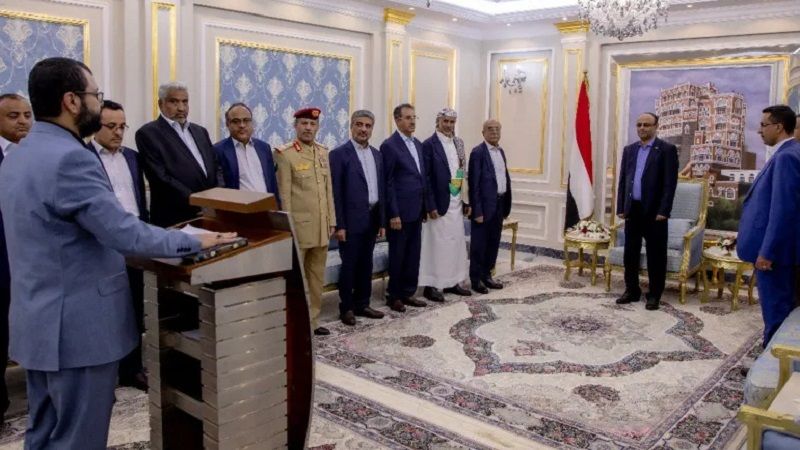About a year ago, Ansarullah leader Abdul Malik al-Houthi promised "fundamental changes" to reform the political structure and fight corruption left over from previous regimes and governments.
Therefore, formation of a new government is significant both because of its form and number of the ministries and because of being the first since the 2022 ceasefire with Saudi Arabia and end of the devastating 7-year war waged by the Saudi-led Arab coalition.
Aiming to carry out fundamental reforms by fighting corruption in the government and selecting ministers based on efficiency and meritocracy has led to the decision to shrink the cabinet by merging ministries, especially that despite the overthrow of the former dictatorship, the administrative structure is still full of elements who work to frustrate, obstruct, and destroy the reform efforts.
In a process that seems to be done to streamline the government and reduce administrative bureaucracy, the new cabinet will include 19 ministries, which shows a decrease of approximately 34 percent in the number of ministers compared to 29 ministries in the previous government. Deputy prime ministers have also been cut from 5 people in the previous government to 3 in the new one.
On the other hand, the entry of young and elite figures to the new cabinet has been remarkable, as only the security and military ministries have not undergone change of ministers.
From the previous cabinet, Major General Abdul Karim Al-Houthi as the minister of interior, Major General Mohammad Nasser al-Atafi as the minister of defense, and Major General Jalal al-Ruwayshan as the deputy prime minister for defense and security affairs retained posts, showing that Yemen feels no problems in the security and defense sectors, rather, Sana'a finds the main challenge in economy, health sector, and education as the extensive foreign sanctions prevail.
In the meantime, most of the new ministers have been new faces who have never held ministerial positions before, such as ministry of information which is given to the famous journalist Hashem Sharafuddin or ministry of foreign affairs that is given to Jamal Amer, the editor-in-chief of Alwasat weekly.
Ansarullah, as the political administration of Yemen, in order to show that it acts very decisively in carrying out fundamental reforms and making the changes demanded by the people and does not consider any criterion other than efficiency and meritocracy in the arrangement of the cabinet even dismissed figures close to the leader of the movement. One of these figures was the older brother of the leader who held health and education ministry posts in the previous government.
But the significant issue in the new cabinet is the attention to form a national comprehensive one with real participation of the political parties.
The first proof to this is the continuation of cooperation of Ansarullah with General People's Congress (GPC) in the jew government. Later in December 2023, the Supreme Political Council voted to dissolve the government led by PM bin Habtour, the southern member of the GPC. And now al-Rahwi, who is politically affiliated with the GPC, is designated as PM.
Another proof showing that the new cabinet is inclusive and comprehensive is selection of ministers from across Yemen, including the southern provinces like Aden, Hadhramout, Marib, and Mahra that are in practice under control of Saudi and Emirati-affilated separatists.
It is noteworthy that al-Rahwi, who was born in Abyan province and is one of the southern leaders, replaced bin Habtour, a politician from Shabwah in southern Yemen and the governor of Aden in 2015.
The nationalistic and inclusive view in the formation of the cabinet by Ansarullah is very important, and while in recent months the residents of the southern regions have complained and protested many times about the dire economic conditions, corruption, foreign interference and the dependence of the political forces present in the Aden cabinet on the foreign actors , Ansarullah with its new cabinet demonstrates that just like defending the territorial integrity of the country against foreign aggression during 8 years of war, now it cares about solving the problems of all Yemeni people regardless of their religion, tribe, and political orientation.
This move will certainly help neutralize false propaganda
accusing Ansarullah of sectarianism and monopolization of power and will
help increase the movement's influence and credit across the country,
especially that the people in the south are living in difficult economic
conditions despite the fact that the major gas and oil revenues are
held by their government in Aden, while the Sana'a cabinet has done much
better, improving the living conditions, protecting security, and
stabilizing foreign currency price.
/129

